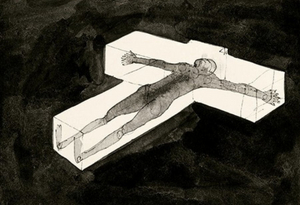JEDERMANN Comes to Salzburg
With Jedermann, Hofmannsthal and Reinhardt made the finiteness of all human endeavours a central and enduring subject of inquiry at the Festival.

Hugo von Hofmannsthal's Jedermann (Everyman), directed by Max Reinhardt with Salzburg Cathedral as a magnificent backdrop, was given as the inaugural performance of the Salzburg Festival on 22 August 1920. Since then, this founding tradition has been seen more than 700 times - a unique occurrence in German-language theatre.
Over the course of an entire century, the performances of Jedermann have held up a mirror to theatre history and the changing times we live in. The ambitious and challenging canvas that Jedermann has offered all artists up to the present day is abundantly demonstrated by the contrasting aesthetics of the productions, various versions of the play, new directorial approaches, live music composed by different contemporary voices, and the periodic recasting of the iconic roles. The Jedermann tradition shows how each generation has the artistic potential as well as the responsibility to renew the work and actively shape its history.
With Jedermann, Hofmannsthal and Reinhardt made the finiteness of all human endeavours a central and enduring subject of inquiry at the Festival.
How do we experience the moment when death enters our life and ushers in an existential reckoning? A moment when we can no longer pretend that everything will just go on as it did before?
Over the decades, the question of how society deals with the finitude of human existence increasingly turned into a question about the fate of a rich man who is suddenly confronted with death. The story of his ostentatious demise in the distant Middle Ages took the focus away from our society. It was as if we didn't want to be reminded every year that we still have to die, despite all the medical and technological advances of our highly developed present.
After almost one hundred years, there then came a first: an unmistakably contemporary alpha male, who swaggered around the Cathedral Square with all his might even while dying. This virtuosic new Jedermann, completely wrapped up in his own emotional world, eventually met his match in the unassailable power of death.
At this moment in time, it is becoming increasingly obvious that we cannot escape the question of what will happen when death enters all our lives. By continuing to rob ourselves of the resources that we need to live, we collectively threaten all humanity with death. We still wage wars, perpetuate injustices and plunder each other and our planet. How much longer are we going to pretend that this can go on forever?
And yet we must play along. Together with my colleagues and collaborators who will oversee the music, costumes, set design, dramaturgy, choreography and lighting, I am excited to take on the fascinating, difficult and unusual challenge of Jedermann for the third time. With a new ensemble of wonderful actors, we will make the text come to life from a new perspective and craft another compelling and collective experience.
We want to use this wonderful challenge to consider what happens when death endangers everything and everyone: love, family, friendships, neighbourhoods, society, humanity. When landscapes dry up and people become impoverished because we are unwilling to share resources. When money loses all value and you can no longer buy anything with it. When the devil comes from within the church and the promise of salvation in the afterlife can no longer console us. But we are absolutely determined not to lose faith in people despite all of this, because empathy, compassion and hope are always possible.
Comments

Videos

